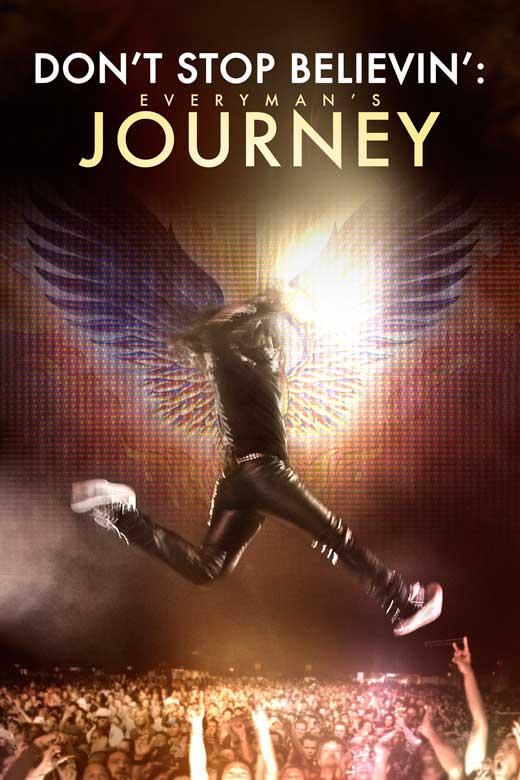|
It's a'right. The strange thing is that while he's totally got the chops to take over --- and he surprises the entire band and their management by being an acrobatic dervish of a frontman, rather than standing operatically up front, interrupted only by a Steve Perry stiff-backed stagger --- what he isn't prepared for is the alienation and exhaustion of the tour, which turns into the band's longest ever, I think. So, the movie ends up turning into a long-form version of the video of "Faithfully," including the trademark shots taken through the giant front window of the tour bus, as the broken white line rolls endlessly by, beautiful landscapes in the distance, that might as well be on TV, because you never get a chance to stop and commune with them.
Like every road ballad ever, the fans make it all worthwhile.
Pineda looks about 26, but the timeline seems to suggest he's closer to 40. And he's got a family back home living a very different life while he's on the road in the US launched suddenly into stardom. Every other member of Journey is a recognizeable brand of classic rock dork. Ross Valory is the avuncular survivor with a Joe Walsh semi-stoned twang, who's probably clean now but has a whole lot of stories if only he could remember 'em. Jonathan Cain is the feather-haired cool guy who takes care of himself and probably has a new age book or two in him, taking Pineda under his wing with diet recommendations and vocal exercises. Neal Schon is somewhere between (almost at the exact halfway point, I would estimate) the Springsteen working-class-hero and the Gene Simmons cynical carnival huckster, committed to the belief (despite the obvious) that he's still running the best rock 'n' roll caravan America has going. Nobody has mastered the rock star guitar squint like he has. Latecoming Motley Crue-wannabe drummer Deen Castronovo could just as easily be touring with Cinderella or Michael Bolton, but is suddenly collecting 1/5 of the take for a huge-selling live touring act. He'll tell you he's played with ALL the best, but Pineda trumps them all.
Main problem is that the band was clearly the initiator of the film, so there's a lot of stuff that you would've like more of, but it doesn't push the current brand. We get relatively quick retrospective of Schon's early career as a teenage wunderkind playing second fiddle in Santana, and the band's first few albums as a progressive outfit. That's all pre-history. History begins with Escape --- the band's pop-rock breakthrough with Perry. We get no mention of the Escape video game, nothing of Perry's shitty solo career leading to the band's disappearance in the mid-eighties. We get a brief glimpse at their attempted restart in the mid-nineties, but no real analysis of how the demand for bitter authenticity of the grunge era made the hammy earnest romantic showmanship of Journey just about the least viable band to push at that moment. We briefly see footage of Steve Augeri, the diabolical figure (sort of a cross between Julian Lennon and Ronnie James Dio) who served as frontman on the oldies circuit from 1996-2004, but no word of future American Idol judge Randy Jackson, the band's bassist during that era. (He appears in one brief photograph.) Jeff Scott Soto, the curly-maned singer who filled in between Augeri and Pineda, might as well not exist.
Most notable is the absence of Steve Perry. All respect is paid to him by Pineda and other Journeyers, but how do you tell this story without knocking on Steve Perry's door and asking him what he thinks about it all?
There's also this poignant moment where the producers are interviewing some 20-ish heartland concert-goers, sucking on cigarettes and oiling themselves in cheap beer as they tailgate before a show at what seems to be the beginning of the tour. The group is asked what they think of the new singer, and one young lady says she wishes he was "from here." One of the male companions calls her racist and the camera zooms in on her as she absorbs the jibe. She kinda is racist and she's reviewing the thought in her mind as the camera holds. It's maybe more a sort of tribalism. Her life is so small that she needs the illusion that this globetrotting band is an extension of her and her people and her familiar community. It's relatable, but it's also wrong, and sad and, yeah, racist. But just when I'm hoping the film-makers stay with this theme, and do more Heavy Metal Parking Lot-type interviews, they cut to Santiago, Chile, which apparently was Pineda's actual debut, and the crowd, delighted to have a big act come visit the southern hemisphere, now with a frontman who speaks Spanish, is absolutely eating chips out of his knickers, and POW!! The new Journey is born.
The film runs about a half hour too long. Too much time is spent interviewing Pineda, who is often saying absolutely nothing, but saying it poetically as he switches from English to Tagalog to Spanish, often mid-sentence, and often without seemingly realizing it. I guess this Spanglishalog is something like the street dialect of Manila. Like so many Filipinos, he's always ready with an engaging youthful smile, even when dreamily discussing the bitter decades of tragedy in his life that pre-dated the call from Schon.
But stay with it until the end --- the last three shows, and their pre-/post-concert backstage receptions --- one in LA, one in San Francisco, and one finally in Manila, are a pretty solid summation of the glory and the alienation and the power and the desperation of being a show bidness figure.
|


